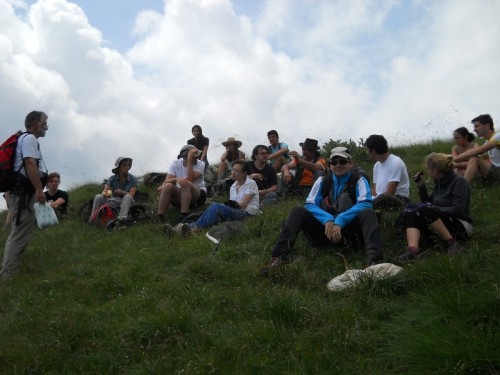Quello che penso è che la paleontologia, come tutte le scienze vada studiata ed approfondita.
Gli scienziati spesso tendono a ritenere estremamente importante il loro campo di ricerca, fino a pensare che sia una priorità assoluta e credo che, seppur esagerato, questo sia un modo per riuscire ad ottenere il meglio da una disciplina e richiede moltissima dedizione.

Ritengo però che i risultati migliori vengano poi ottenuti quando ci si rende anche conto che il tutto sia solo un ago in un pagliaio e, nonostante l’entusiasmo, farne a meno non avrebbe cambiato così tanto il corso delle cose …cosa che poi si rivela non sempre vera. Certe scoperte hanno cambiato certamente il nostro mondo ma il mondo poi, probabilmente andrà avanti anche senza di noi …tra un po’!
Questo ovviamente parlando in termini paleontologici e geologici!
La Paleontologia (ovvero lo studio dei fossili) è una scienza quanto mai complessa e che richiede un background di biologia, zoologia, botanica, sedimentologia, geologia, stratigrafia, ecc, ecc.
Il pensiero comune è che la Paleontologia siano i Dinosauri. Ok. Anche se lo fosse (e non lo è), sono estremamente complessi gli studi seri per arrivare alle ricostruzioni dell’animale e dell’ambiente in cui viveva, per non parlare della ricostruzione delle sue abitudini e comportamenti, cosa che non sempre è possibile ma, se lo è, è solo nel caso in cui si trovino tracce fossili (le stesse tracce che può studiare un investigatore) importanti, significative e univoche.
La didattica attuale tende a ‘raccontare’ di Paleontologia ai bambini ed io penso che ogni argomento scientifico, quindi anche la paleontologia, se trattata da un addetto ai lavori, possa allargare il modo di pensare di un bambino o di un ragazzo ma a questo proposito volevo raccontare un aspetto, solo in qualche riga, la classica visita guidata in grotta o in museo o in ambiente naturale (cosa che personalmente apprezzo molto di più) fatta dalla classica famigliola con figli piccoli…
“Andiamo a vedere la grotta dell’orso”, “Andiamo al Museo di Storia Naturale” “Andiamo a vedere i fossili di quella Montagna”… E il risultato è sempre quello: I bambini sono inevitabilmente entusiasti per qualche minuto e poi i genitori o parenti adulti ci si mettono sempre di mezzo e allora le domande sono fatte più dai grandi che dai piccoli e scatta quell’interesse per la conoscenza che va al di là del racconto. La paleontologia è una scienza. Lo studio della scienza si impara ed ha un suo modo di essere condotto.
La scienza può essere presa certamente e volentieri come un gioco. Ma è un gioco mooooolto complicato!
…per bambini?
Certo che è per bambini!
Ma anche per quelli dai 20 anni in su!!! …salvo eccezioni s’intende!!! …qualcuno resta bambino anche un bel po’ dopo. Io ne sono la prova!!!!


